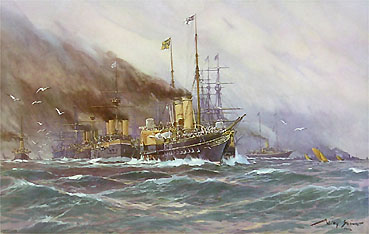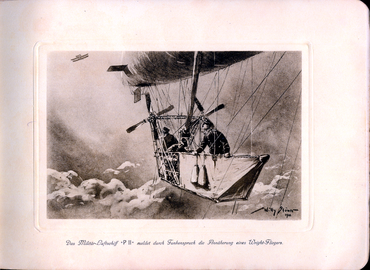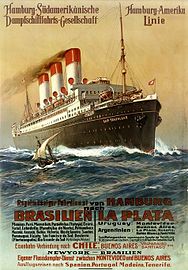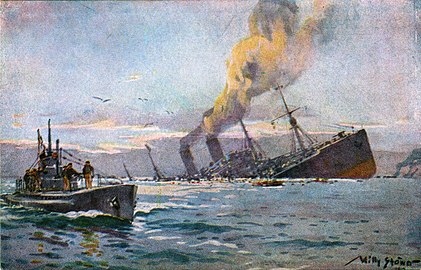Willy Stöwer: Difference between revisions
→Life: Added date to caption |
No edit summary |
||
| Line 32: | Line 32: | ||
}} |
}} |
||
}} |
}} |
||
'''Willy Stöwer''' (22 May 1864 – 31 May 1931)<ref>{{cite web|title=Willy Stower|url=http://www.askart.com/AskART/artists/biography.aspx?artist=11073111|publisher=AskART|accessdate=1 May 2012}}</ref> was a [[Germans|German]] artist, [[illustrator]] and author during the [[German Empire|Imperial Period]]. He is best known for [[Marine art|nautical paintings]] and [[lithograph]]s. Many of his works depict historical maritime events such as the [[sinking of the RMS Titanic|sinking of the RMS ''Titanic'']] in 1912. |
'''Willy Stöwer''' (22 May 1864 – 31 May 1931)<ref>{{cite web|title=Willy Stower|url=http://www.askart.com/AskART/artists/biography.aspx?artist=11073111|publisher=AskART|accessdate=1 May 2012}}</ref> was a [[Germans|German]] artist, [[illustrator]] and author during the [[German Empire|Imperial Period]]. He is best known for [[Marine art|nautical paintings]] and [[lithograph]]s. Many of his works depict historical maritime events such as the [[sinking of the RMS Titanic|sinking of the RMS ''Titanic'']] in 1912. |
||
Revision as of 05:38, 16 November 2019
Willy Stöwer | |
|---|---|
 Stöwer in 1913 | |
| Born | 22 May 1864 |
| Died | 31 May 1931 (aged 67) |
| Nationality | German |
| Education | self-taught |
| Known for | Naval art, Imperial German period Commercial art |
| Notable work | Der Untergang der „Titanic‟ |
| Spouse | Henrietta Dettmann |
| Patron(s) | Kaiser Wilhelm II |
| Signature | |
| Signature | |
Willy Stöwer (22 May 1864 – 31 May 1931)[1] was a German artist, illustrator and author during the Imperial Period. He is best known for nautical paintings and lithographs. Many of his works depict historical maritime events such as the sinking of the RMS Titanic in 1912.
Life
Willy Stöwer, the son of a sea captain, was born in Wolgast, Germany on the Baltic coast. He originally trained as a metalworker and worked as a technician in the engineering offices of various German shipyards. He soon received commissions as a draftsman, illustrator and painter. His talent was recognized early and his painting technique was self-taught. In 1892 he married Henrietta Dettmann from a wealthy family, and this allowed him to devote himself exclusively to his work as an artist.[2]

Kaiser Wilhelm II became an enthusiastic supporter and patron of the artist and Stöwer was said to be the Kaiser's favorite naval painter.[3] Stöwer even accompanied the Emperor on several voyages between 1905 and 1912. He was a board member of the German Navy League (Template:Lang-de) and was awarded an honorary professorship in 1907. The course of his life then followed that of his patron and the fate of the Imperial German Navy. As with contemporaries such as Hans Bohrdt, his greatest creative period came to an end with the abdication of the Kaiser and the passing of the Imperial era. His later career, being without Imperial favor, relied on a few commissions from steamship lines. He died in relative obscurity at his Berlin-Tegel villa[a] on 31 May 1931, nine days after his 67th birthday.[2] Stöwer is interred in Cemetery III of the Jerusalem and New Churches in Berlin, where the grave remains preserved.[5]
Career

Illustration for „Die Gartenlaube‟, 1912
Stöwer was a very prolific artist between 1892 and 1929, creating approximately 900 black-and-white and 335 color illustrations for 57 books, as well as posters, postcards, trading-cards, labels, brochures and calendars.[6] An early example of his Commercial art is a series of trading cards from 1899~1900 which he made for the German chocolate producer Stollwerck entitled The New German Warships in Scrapbook No. 3, Series 132.[7]

Stöwer's representation of the sinking of the RMS Titanic in the magazine Die Gartenlaube earned him a special popularity. He created the illustration shortly after the disaster in 1912 without detailed information, in particular, the fourth funnel did not eject black smoke as it was only for ventilation. However, the image became iconic despite minor errors and has been reprinted numerous times even to the present day. Stöwer, not known for portraiture, also painted a portrait of the Kaiser in a naval uniform, which along with some of his naval paintings, hang in the Kaiser's Room[8] at Achilleion, the Kaiser's summer palace from 1907 to 1914[9] (currently a museum)[10] on the Island of Corfu.
Other examples of Stöwer's work currently in museums include oil on canvas: Sinking of the Italian destroyer "Turbine" by Austrian destroyers on 24 May 1915.[11] at the Military History Museum, Vienna,[12] and: Speedboat ahead! at International Maritime Museum of Hamburg.[13] In 1917, postcards were produced from some of his paintings for charitable aid to benefit wounded U-boat crew members and families of the deceased during World War I.[6]
Gallery
- Willy Stöwer examples in various media (with associated text translated)
-
Painting (ca. 1888)
SMY Hohenzollern I -
Brochure illustration (1910)
For Luftfahrzeug-GmbH
"The military airship 'P II' reports by radio the approach of a Wright Flyer." -
The return of U-9 to Wilhelmshaven, Germany (1914)
-
Attack of U-21 on the Linda Blanche (1915)
-
Postcard (1917)
"Sinking of a hostile armed troop carrier by German submarine in the Mediterranean Sea".
Published works
In addition to his works in the visual arts, he wrote, published or edited several German books, and is credited as co-author on many more. Books by Willy Stöwer include:
- 1929 : To Sea with Brush and Palette.[c] Includes reminiscences of the author's voyages with Kaiser Wilhelm II.[15]
- 1916 : German U-boat Actions, in Words and Pictures.[d][16] Published collection of reproductions of paintings of submarines; text in German on pages facing illustrations.[17]
- 1912 : Kaiser Wilhelm II and the Navy.[e] Conceived in honor of 25th anniversary of the Kaiser's rule.[18]
- 1905 : The German Sailing Sport.[f] (Editor) Stöwer's comprehensive compendium of the German sailing sport from the early heyday of yachting in the German Empire.[20]
- 1901 : Marine ABC.[g] Children's alphabet book
- 1900 : German Fleet Maneuvers: After Watercolors and Studies.[h]
- 1898 : Germany's Navy: With use of Official Materials for Original Watercolors. [i]
Biography (monograph) by Jörg M. Hormann: Marine Painter of the Empire, Willy Stöwer[21]
See also
Notes
- ^ a b The Stöwer Villa at 68 Gabrielenstraße is listed as a Berlin cultural monument[4]
- ^ According to folk tradition, water collected by a maiden on Easter morning before the sun's rays touch it has special properties[14]
- ^ Willy Stöwer (1929), Zur see mit Pinsel und Palette , Braunschweig [etc.]: G. Westermann, OCLC 4360549
- ^ Stöwer, Prof. Willy (1916). Deutsche U-Boot-Taten, in Bild und Wort. München / Berlin: F. Bruckmann / Reichsmarinestiftung.
- ^ Wislicenus, Admiralitastrat Georg; Stöwer, Prof. Willy (1912). Kaiser Wilhelm II. Und die Marine. Berlin: August Scherl. pp. 207.
- ^ Stöwer, Willy (1905). Der Deutsche Segelsport. Leipzig: F. A. Brockhaus.[19] OCLC 39156819
- ^ Stöwer, Willy (1901). Marine ABC. Leipzig: Spamer. OCLC 248341146
- ^ Stöwer, Willy (1900). Deutsche Flottenmanöver: Nach Aquarellen u. Studien. Braunschweig: Westermann.
- ^ Stöwer, Willy (1898). Deutschlands Kriegsflotte: Mit Benutzung amtlichen Materials nach original Aquarellen. Berlin: Kutzner & Berger.
References
- ^ "Willy Stower". AskART. Retrieved 1 May 2012.
- ^ a b Hormann, Jörg-Michael (2001). Willy Stöwer. Marinemaler der Kaiserzeit. Leben und Werk (in German). Koehlers Verlagsgesellschaft. ISBN 3-78220-822-6.
- ^ Rüger, Jan (2007). The Great Naval Game: Britain and Germany in the Age of Empire. Cambridge University Press. p. 207. ISBN 978 0 521 87576 9.
- ^ "Liste, Karte, Datenbank / Landesdenkmalamt Berlin". www.stadtentwicklung.berlin.de (in German). No. 09011991.
{{cite web}}: CS1 maint: location (link) - ^ "Wurzburg, Bayern: Hauptfriedhof". Androom. Berlin: Kirchhof Jerusalem und Neue Kirche III. Retrieved 24 April 2018.
- ^ a b Petrulis, Alan. "Willy Stower 1864-1931". S - ARTISTS. Metropolitan Postcard Club. Retrieved 4 May 2012.
- ^ Image from German Wikimedia Commons: (1900) Sammelalbum Nr. 3, Gruppe Nr. 132; Gebr. Stollwerck Stammhaus: Köln am Rhein.
- ^ Μena, Μary. "KAISER'S ROOM". Retrieved 30 April 2012.
- ^ Greek National Tourist Organisation information window at the Achilleion Grounds (image on Wikimedia Commons)
- ^ "Achilleion (description)". Retrieved 27 September 2012.
- ^ Seegefecht. Versenkung des italienischen Zerstörers "Turbine" durch österreichische Zerstörer am 24. Mai 1915. Öl auf Leinwand, 50×75 cm.
- ^ "Heeresgeschichtliches Museum, Wien".
- ^ Schnellboot vor! (1913); Internationales Maritimes Museum Hamburg
- ^ "Osterwasser- The Legend of Easter Water". German Girl in America. Retrieved 23 April 2018.
- ^ Willy Stöwer (1929), Zur see mit Pinsel und Palette, Braunschweig [etc.]: G. Westermann, OCLC 4360549
- ^ Stöwer, Prof. Willy (1916). Deutsche U-Boot-Taten, in Bild und Wort. München / Berlin: F. Bruckmann / Reichsmarinestiftung.
- ^ "Prints & Photographs Online Catalog / Record". Library of Congress. Retrieved 7 May 2012.
- ^ "6 IMPERIAL GERMAN NAVY KRIEGSMARINE BOOKS w/ STÃ-WER". WorthPoint. Retrieved 9 May 2012.
- ^ "Digital Library: Der deutsche Segelsport". Hathi Trust. Retrieved 9 May 2012.
- ^ "Kurzbeschreibung". amazon.de. Retrieved 10 May 2012.
- ^ Jörg M. Hormann (2001), Marinemaler der Kaiserzeit, Willy Stöwer, Hamburg: Koehlers Verlagsgesellschaft, ISBN 3782208226
External links
 Media related to Willy Stöwer at Wikimedia Commons
Media related to Willy Stöwer at Wikimedia Commons


![Magazine illustration for Die Gartenlaube (1893) "The walk to the Easter Water"[b]](/upwiki/wikipedia/commons/thumb/e/e5/Die_Gartenlaube_%281893%29_b_197.jpg/194px-Die_Gartenlaube_%281893%29_b_197.jpg)






